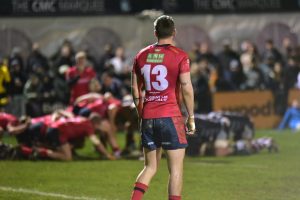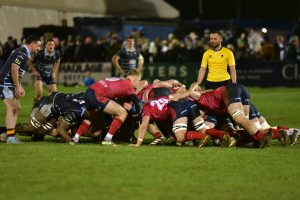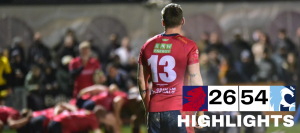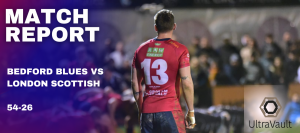Last week, we caught up with our five-strong Development team to get some background knowledge on each of them and discover more about their roles and responsibilities at the Club.
Ross Peacock, Community Development Officer:
What do you see as your main role at the Club?
My main role is to develop and establish positive working relationships with local schools, clubs and businesses.
From this I look to provide fun and enjoyable rugby sessions both in and out of curriculum time and encourage as many young players as possible to play their rugby at London Scottish.
I also work alongside Corné du Rand, Club Development Manager, to ensure that all sections of grassroot and amateur rugby continue to grow and develop.
We ensure there is an established player pathway in place to provide young, aspiring rugby players with the opportunity to play their rugby at the highest level possible.
We also want to make sure the London Scottish name and brand is a recognised and an appealing name in the local community.
How have things developed this year?
The Community Programme is now in its sixth year of coaching rugby in Primary and Secondary Schools.
So far it has been a huge success with children and young adults of all ages receiving quality coaching in and out of curriculum time with the benefits showing both on and off the pitch.
During season 2013/14 we have seen a significant increase in numbers playing for our grassroots section.
The introduction of both the academy set-up and the girls section this season can only back this up.
Of course we need to ensure that this momentum continues and we continue to build on all the hard work that everyone is doing at the club.
I am extremely excited about the future and what it holds, not only for the community programme, but indeed for the club as a whole.
Corne Du Rand, Club Development Manager
What’s your main responsibility at the Club?
I am responsible for the amateur section of the club which is the minis, juniors, girls, seniors and also the developing rugby academy.
How has 2013 been for you?
We have worked hard on our recruitment and have seen an influx of players from the minis right through to the academy and we continue to welcome new players to the club.
Our U6s and U7s have been a big focus but we have also targeted players through all the age groups in schools via the community team's efforts.
Our volunteers at the club are brilliant and we are working on their coach education, putting them through the different coaching courses so they are confident in their coaching ability and style.
We had a great minis festival in October attended by more than 900 players, which was organised really well by Ian Hannah, our minis chairman and the London Scottish volunteers.
All the clubs who attended had a lot of praise for how it was run.
Our girls rugby section is building and we are continuing to recruit players to be able to play competitive matches.
The juniors are growing in numbers too due to our good coaching set-up and the work done by the Community Team through their coaching programs in local schools.
Our senior academy has had a really good first intake of players and our junior academy players have taken part in some cracking games.
Finally our senior amateurs regularly put three teams out and also an occasional side.
What are your aims for 2014?
The big focus will continue to be the academy and to attract the best young players and put them in a professionally managed environment for their development.
We are also looking to grow our girls rugby section while we fill all our age group teams with the right numbers
Ben Pattenden, Community Coach
What's your current rugby background, out with working in the Community Section?
I’ve recently moved to London from Australia, where I was a member of the junior Act Brumbies Teams.
I’m currently a member of the London Scottish Senior Academy, training full-time with the pro team having made my first team debut against Edinburgh Accies in the B&I Cup.
Why did you decide to get into Community Rugby?
I joined the community rugby team at London Scottish because it allowed me to get more involved whilst also giving something back to the club.
Coaching is something that interests me having just completed my Level Two qualification and the community coaching at the club is a great way for me to develop as a coach.
What's the best part of the job?
The best part of being a community coach at London Scottish is seeing the satisfaction on the players faces after they have learnt and improved a skill that the coaches have been teaching them in that session.
Paul Spivey, Community Coach and Professional Rugby Player at London Scottish
Tell us about your rugby career to date?
Before moving to the Championship I played in Dublin for two years at Old Belvedere RFC.
My first Championship team was Moseley where I played for two seasons.
I did a lot of community work there before I moved to London Scottish at the beginning of last season.
Why did you get involved with the London Scottish Community team
I started working in schools a few years ago and I enjoyed it.
I felt it was a good way to keep coaching and brush up on my skills.
What's the best part of the job?
I enjoy seeing a group pick up a rugby ball for the first time, progress to a team that are winning school games.
It’s also very pleasing when kids want to join our youth section off the back of our coaching sessions.
Cameron Leigh , Community Coach
What's your current rugby background?
I’m the senior academy captain and also captain of the Highlanders team.
Why did you decide to get into Community Rugby?
When I was younger I was always involved in a rugby camp and when a rugby team came to visit my school I remember how happy and excited I was when they arrived.
Joining the community team at London Scottish gave me a perfect opportunity to give back to the community and help others develop through rugby.
What's the best part of the job?
The best part of the job is seeing the children smile during and after the rugby session, giving me a feeling that I have given something back to the community and I'm leaving the school with smiles on pupils’ faces.



